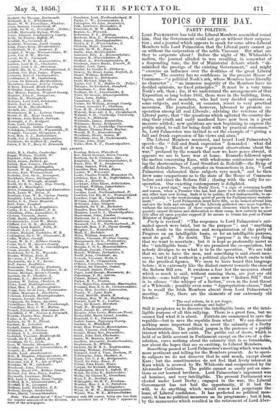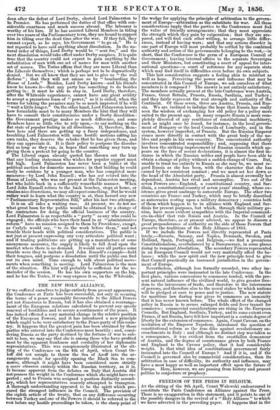TOPICS OF THE DAY.
PARTY POLITICS. '
LORD Pamsrox has told the Liberal Members assembled round him, that the Government could not go on without their coopera- tion ; and a journal which appears to speak for some ultra-Liberal Members tells Lord Palmerston that the Liberal party cannot go on without the cooperation of the noble Viscount. But what are they to cooperate about ? Before the night of Mr. Whiteside's motion, the journal alluded to was recalling, in somewhat of a desponding tone, the list of Ministerial defeats which " di- minished the prestige of the existing Government," and might " exercise an influence over the destinies of the great Liberal cause." The country has no confidence in the present House of Commons—" a political Noah's ark, whose Members have literally no character " ; " an immense majority of the Members have no decided opinions, no fixed principles." It must be a very tame Noah's ark, then ; for, if we understand the arrangements of that Exposition so long before 1851, there were in the building, lions, tigers, and other members, who had very decided opinions on some subjects, and would, on occasion, resort to very practical measures. The journalist, however, laboured to promote co- operation among all real Liberals ; advising the veterans of the Liberal party, that "the questions which agitated the country du- ring their youth and early manhood have now been in a great measure settled ; new questions are now beginning to engross the public mind, to call for being dealt with by practical statesmen." So, Lord Palmerston was invited to set the example of "giving a full and frank expression of his views and aims."
The Liberal Members mustered, and heard Lord Palmerston's speech—the "full and frank expression" demanded : what did it tell them ? Much of it was "general observations about the war," prefaced by the remark that now we have peace abroad, it appears we are to have war at home. Remarks followed upon the motion concerning Kars, with wholesome confessions respect- ing the shortcomings of Lord Stratford de Radcliffe—the Byng of official defaulters. Next, episodes on transactions in Asia. "Lord Palmerston elaborated these subjects very much," and he then drew some comparisons as to the state of the House of Commons before and since the Reform Bill ; closing with the rally for co- operation. Our exacting contemporary is delighted.
"it is a good sign," says the Daily News, "a sign of returning health and reason, when a Premier who has had more to do with coalitions than any other man now living, finds it to be politic, if not indispensable, to ap- peal manfully to the reawakening spirit of party for Parliamentary sustain- ment." . . . . " Lord Palmerston must have felt, as he looked around him and saw the bulk and strength of the Liberals gathered once more together, without the intermixture of those equivocal elements which have so fre- quently caused division and dislocation in their camp, how entirely he must rely after all upon popular support if he means to retain his post as Prime Minister of England."
Party is revived ! "The responses to Lord Palmerston's ani- mated speech were brief, but to the purpose " ; and. "anything which tends to the reunion and reorganization of the party of Progress on an intelligible basis, or for an intitiligible purPose, must do good." No doubt. The " purpose " is the very thing that we want to ascertain ; but it is kept as profoundly secret as the "intelligible basis." We are promised the co-operation, but nobody divulges to us what is to be the operation. We are told that we are to have the men, and something is said about mea- sures; but it is all worked in a political algebra which omits to tell us the practical figures. We seem to have heard this language before ; it is extremely like the dialect current towards the close of the Reform Bill Eera. It awakens a fear lest the measures about which so much is said, without naming them, are just our old friends—some half-ripe " pear " ; some new "Reform Bill" that is to silence "the whisper of a faction," even in the loud throat of a Whiteside ; possibly even some "Appropriation-clause," that is to recall the Irish Members absent from Lord Palmerston's meeting. Nay, there are the elements of our extremely old friend-
" The real reform, be it not forgot, Extended suffrage and ballot."
Still it perplexes us to discover the intelligible basis, or the inteb. ligible purpose of all this rallying. There is a great fuss, but we cannot find what it is about. Patriots are summoned to save the republic—but to save the republic from what? We can discover nothing- more important than to avert the calamity of a Derby Administration. The political jargon is the pretence of a public interest which does not exist. The public out of doors, which is held of so little account in Parliament except on the eve of a dis- solution, cares nothing about the calamity that is so formidable, nor about the hopes that are so exciting, to Liberal Members. Something passed at Lord Palmerston's meeting which was much more pertinent and telling for the Members present. As to speci- fic subjects we do not discover that he said much, except about Kars ; but the constituencies do not feel that lively interest in Kars which is avowed by Mr. Whiteside and reciprocated by Sir Alexander Cockburn. The public cannot so en ily put on emo- tions as our learned brethren. Lord Palmerston's argument was ad hemlines, and very intelligible. The present Parliament was elected under Lord Derby ; engaged in the war, the Liberal Government has not had the opportunity, if it had the will, to do anything which would renew and. perpetuate the lease. of Liberal confidence. It has perfected no political. mea- sures, it has no political measures on its programme ; but it has, by the manoeuvres which resulted in the retirement of Lord Aber- deen after the defeat of Lord Derby, elected Lord Palmerston to be Premier. He has performed the duties of that office with con- siderable smartness and much success abroad. The labourer is worthy of his hire. If he has assisted Liberal Members in tiding over two years of the Parliamentary term, they are bound to support him in tiding over the dead time after the war. If they fail, they cannot expect, as he says, his Government "to go on." He is not reported to have said anything about dissolution. In the na- tural order of things, Lord Derby would be "sent for," and the next dissolution would take effect under Derby auspices. It is quite true that the country could not expect to gain anything by the substitution of men with one set of names for men with another set of names. The Tories affirm that they are more Liberal than the Liberals themselves ; which is perhaps not to be dogmatically denied. But we all know that they are not to give us the real Reform " ; that they will not amuse us by bombarding the House of Lords." Besides, Lord Derby knows—and his friends know he knows it—that any party has something to do besides getting in ; it must be able to stay in. Lord Derby, therefore, after the Whiteside experiences, cannot have any great avidity to accept a precarious lease of "power," as it is called, when the terms for taking the premises may be so much improved if he will "wait a little longer." On the other hand, Lord Palmerston knows how formidable must be to many Members the hint that they will have to consult their constituencies under a Derby dissolution : the Government prestige makes so much difference and some Members have so little else to rely upon,—to say nothing on the flat state of popular feeling in all directions. If, therefore, Mem- bers here and there are getting up a fussy independence, and troubling Lord Palmerston with some hostile motions arill5ng his own ranks, they deserve the rebuke that he has given them, and they can appreciate it. It is their policy to postpone the dissolu- tion as long as they can, in hopes that something may turn up giving them a pretext for going to the country.
The Liberal organ already quoted has thrown out the hint that any leading statesman who wishes for popular support must bid high. Lord Palmerston has never been a bidder at the political auction for domestic measures; in that bidding he could easily be outdone by a younger man, who has completed more measures—by Lord John Russell ; who has not retired into the House of Lords, who was not present at the Palmerston meeting, but who holds back in a sufficiently remarkable manner. When Lord John Russell retires to the back benches, stops at home, or studies nice diseretions, we may all expect something. But he would rather wait to learn what the country is at, than hazard any new "Parliamentary Representation Bill, after his last two attempts.
It is on all sides a waiting race. At present, we do not see what great boon for the public would be obtained by a change of the contractors for doing the official business of the country Lord Palmerston is as respectable a "party" as any who could he engaged ; the officials who have their hand in at "administrative reform have no mission assigned to them by Providence, excapt, as -Carlyle Would say, "to do the work before them," and not trouble their heads with political considerations. The public is not just at present expressing any very articulate political want ; and if trading politicians are getting up a manufacture of some anonymous measures, the supply is likely to fall dead upon the market where there is no demand. It would save all parties some trouble were they to imitate Lord John Russell's example—hold their tongues, and postpone a dissolution until the public can find out its own mind. Time enough to talk about political move- ments when something is moving. Lord Palmerston is the man of the situation. His hint will probably be sufficient for the re- mainder of the session. He has his own supporters on the hip, and he has the Tories, if we may express it so, on the Whiteside.







































 Previous page
Previous page